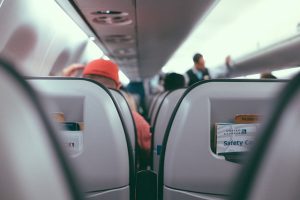
It’s a common myth that the air inside of airplane cabins is dirty. When flying aboard a commercial airplane, you’ll typically breathe in a mixture of about half fresh air and half fresh air.
Commercial airplanes are equipped with air filters that clean the cabin air. According to the U.S. Federal Aviation Administration (FAA), most commercial airplanes now use high-efficiency particulate (HEPA) air filters. What are HEPA air filters exactly, and why do airplanes use them?
What Are HEPA Air Filters?
HEPA air filters are pleated filters that are designed to remove particularly small, fine particles of pollutants from the air. All air filters are designed to remove particles of pollutants from the air. HEPA air filters, though, must be able to remove 99.97% or more of particles measuring 0.3 microns or greater.
Only air filters that meet these filtration requirements can be labeled and sold as HEPA air filters. If an air filter removes fewer or bigger particles, it’s not a true HEPA air filter.
How HEPA Air Filters Work
HEPA air filters work by catching airborne pollutants. As previously mentioned, they are designed specifically to remove at least 99.7% of all particles measuring 0.3 microns or greater. In airplanes, HEPA air filters are used to clean the cabin air.
Airplanes circulate their cabin air through a filter, such as a HEPA air filter. As the cabin air passes through the HEPA air filter, it will leave behind particles of pollutants. The HEPA air filter will catch these particles while simultaneously allowing clean air to pass through it.
Why Airplanes Use HEPA Air Filters
There are different types of air filters. You can find air filters in different shapes, materials and more. Nonetheless, most commercial airplanes use HEPA air filters. Some of them may use HEPA air filters in a different size or shape, but most commercial airplanes use HEPA air filters.
The reason airplanes use HEPA air filters is passenger safety. HEPA air filters are able to remove smaller, finer particles of pollutants from the air than traditional air filters.
According to Boeing, all of its airplanes are designed with HEPA air filters. Boeing airplanes use the same HEPA air filters as those found in hospitals, meaning they can remove up to 99.9% of viruses and bacteria from the air. Other, non-HEPA air filters are less effective at removing viruses and bacteria. Therefore, most commercial airplanes use HEPA air filters so that passengers are better protected from transmissible illnesses.



